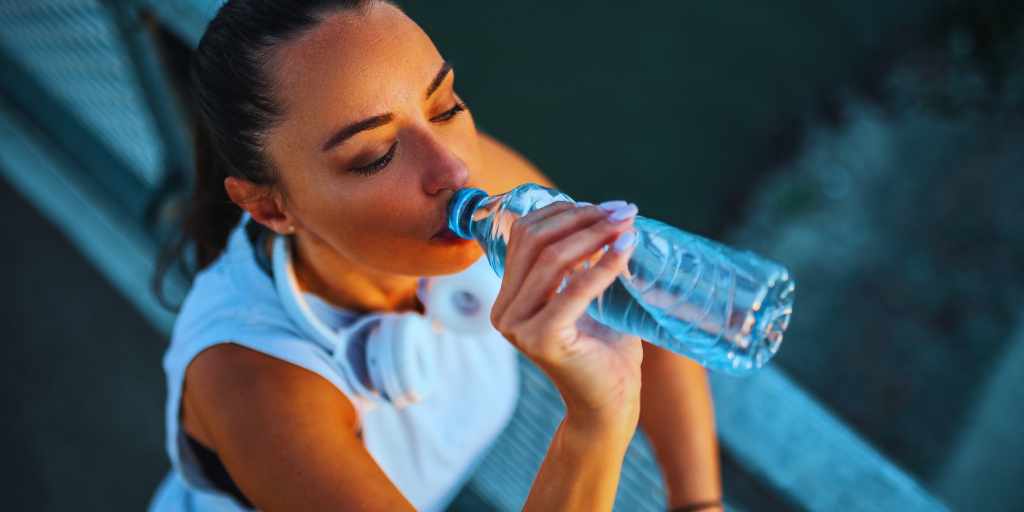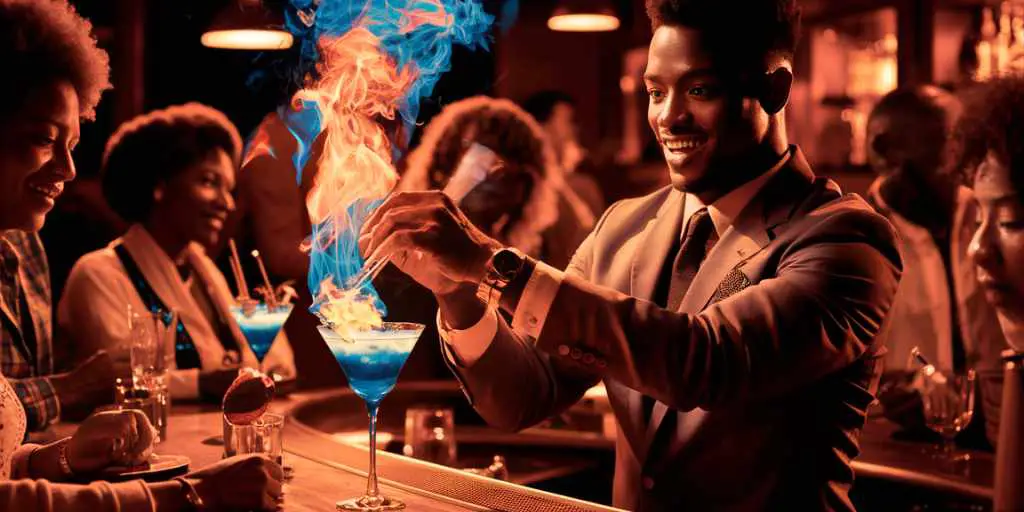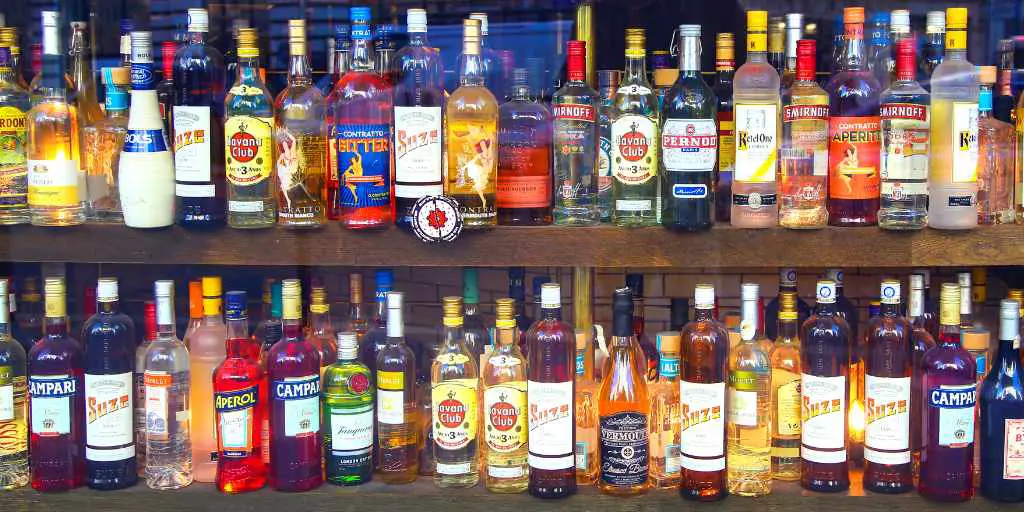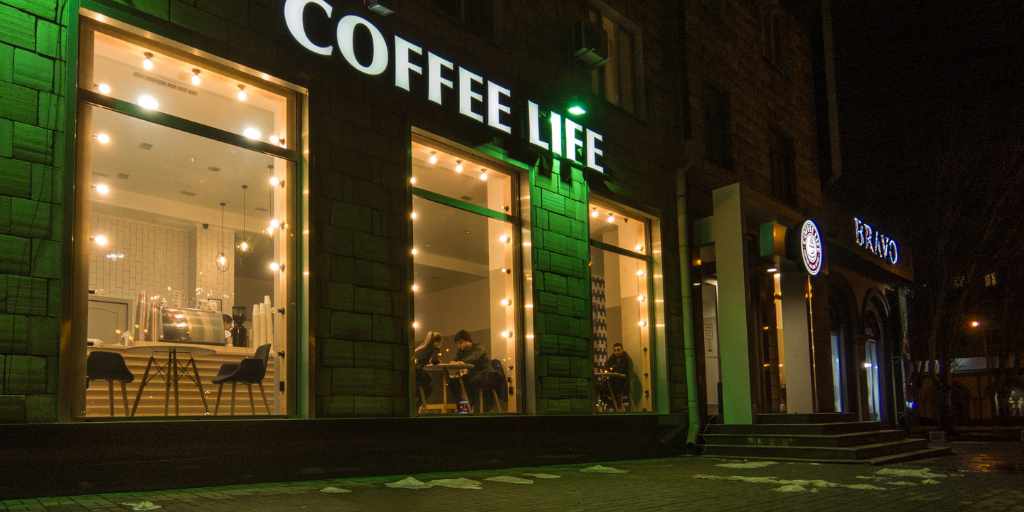Working as a bartender often involves long shifts in a fast-paced, warm environment, which can quickly lead to dehydration if one is not careful. Staying properly hydrated is essential for maintaining personal health and well-being and ensuring peak performance on the job. Considering the demanding nature of bartending, it’s crucial to implement effective hydration strategies.
Hydration is critical given the diuretic properties of alcohol; bartenders frequently handling and sometimes consuming alcoholic beverages need to be extra vigilant about their fluid intake.
Key Takeaways
- Proper hydration is crucial for bartenders to maintain health and performance.
- Regular water intake, even when not thirsty, helps prevent dehydration.
- Avoid drinks that contain caffeine or alcohol, as they increase dehydration.
- Recognizing early signs of dehydration enables prompt and effective response.
Understanding Hydration and Alcohol
Hydration is critical for bartenders, who often work in environments where alcohol consumption can quickly lead to dehydration. They need to recognize the fine balance between serving drinks and maintaining their own fluid levels for optimal health.
The Importance of Proper Hydration
Proper hydration is fundamental for maintaining the body’s functions, including the digestive system and body temperature regulation. An individual’s fluid intake must be balanced to remain properly hydrated.
This is particularly important for bartenders, as their work environment can accelerate fluid loss. Drinking water should be a regular practice. They are recommended to consume water before, during, and after their shift to counteract the effects of a potentially dehydrating environment.
Effects of Alcohol on Hydration
Alcohol is a diuretic, which means that consuming an alcoholic beverage can lead to increased production of urine. This can quickly cause dehydration, as the body loses more fluid than it takes in. Even mild dehydration can affect concentration and cognitive functions—crucial aspects for any professional bartender.
Drinking alcohol also impairs the body’s ability to sense early signs of dehydration, which underscores the need for bartenders to stay properly hydrated by consciously increasing their drinking water intake.
Here’s a brief overview of how to maintain hydration along with your body weight:
- For every pound of body weight: Drink about 0.5 ounces (15ml) of water.
- During a bartending shift: Incrementally consume water, aiming for at least 8-16 ounces per hour.
Practical Hydration Strategies for Bartenders
Bartenders must prioritize staying hydrated amidst the busyness of their shifts, as this helps maintain their concentration and energy. Effective hydration techniques and beverage choices are key components to a successful water game behind the bar.
Hydrating Effectively During Shifts
To ensure one remains hydrated, it’s essential to drink water at regular intervals. This can be facilitated by keeping a personal water bottle within reach. A practical approach is establishing a routine, like taking a few sips of water every half hour or after serving a set number of customers. This can prevent dehydration, which can be exacerbated by the typically warm environment of a bar, as well as aiding mental clarity.
Another strategy is to create a hydration station in the bar area where staff can quickly access water without disrupting their workflow. Employers should encourage this practice, which underscores the importance of staying hydrated. Additionally, bartenders can integrate hydrating foods such as fruits and vegetables into their meals during breaks, aiding their fluid levels.
Choosing the Right Beverages
While bartenders are surrounded by various drinks, choosing the right beverages for hydration is crucial. Water is the most efficient way to stay hydrated, but sometimes one may crave variety. In this case, bartenders can opt for drinks with high water content, like herbal teas or diluted fruit juices, which provide hydration and a refreshing taste.
Bartenders should be cautious of beverages that contain caffeine or alcohol, as these can lead to increased urine production and potential dehydration.
Instead, opting for electrolyte-replenishing sports drinks can be beneficial, especially during longer shifts. These beverages are designed to help your body maintain fluid balance and can be especially handy in a high-paced work environment.
By integrating these hydration strategies into their routines, bartenders can better manage their hydration needs and remain hydrated throughout their shifts. This, in turn, allows them to provide the best possible service to their customers while taking care of their health.
Maximizing Hydration with Food and Snacks
Effective hydration for bartenders isn’t limited to the drinks they serve; it also involves taking care of yourself, including getting a good night’s sleep and the food and snacks they choose to consume. Harnessing the hydrating power of certain foods can help maintain optimal hydration levels during busy shifts.
Foods to Promote Hydration
- Fruits and Vegetables: The high water content in many fruits and vegetables makes them perfect for hydration. They suggest incorporating fruits like watermelon and strawberries, which have over 90% water content. Additionally, cucumbers and bell peppers are crunchy and refreshing and a great source of water and essential electrolytes.
- Taste Matters: They recommend choosing fruits and vegetables that hydrate and please the palate, making hydration an enjoyable endeavour. Adding a sprinkle of herbs or a dash of salt can enhance the taste and encourage more frequent consumption.
Smart Snacking at the Bar
- Salty Snacks: A small amount of salty snacks can be beneficial, as salt can assist in retaining water and may encourage drinking more fluids. However, they caution against overindulgence, as too much salt can be counterproductive to hydration.
- Sugar Considerations: They are mindful of the sugar content in snacks, as high amounts can lead to dehydration through increased sweat production. Hence, when reaching for a snack bar or fruit, they opt for options with natural sugars and avoid those with added sugars.
Incorporating hydrating foods and smart snacking habits not only aids in maintaining hydration but also ensures sustained energy levels and enhanced overall health for bartenders.
Recognizing and Addressing Dehydration
Bartenders often work in environments that can lead to dehydration, which can impact their ability to manage their tasks and maintain mental clarity mentally. Recognizing the early signs and how to recover from dehydration are essential for bartenders to maintain their energy and ensure a light, happy hour atmosphere for patrons.
Early Signs of Dehydration
Early indicators of dehydration often begin subtly before progressing to more severe symptoms. Bartenders should be mindful of these signs, especially during a busy bar crawl or when the pace of work doesn’t allow frequent breaks to drink:
- Feeling Thirsty: This primary signal shouldn’t be ignored—it’s the body’s initial signalling low on fluids.
- Fatigue: A loss of energy during a shift might be more than just tiredness; it could be the body fighting fatigue due to dehydration.
- Muscle Cramps: If they or their co-workers start experiencing muscle cramps, this can signify lost fluids and electrolytes.
- Concentration Difficulties: Trouble focusing or a lapse in mental clarity often accompanies dehydration, making it hard to perform efficiently.
Recovering from Dehydration
Once signs of dehydration are detected, taking swift action can aid in quickly restoring hydration levels. For bartenders, the following tips can be handy:
- Increase Fluid Intake: Drinking water should be the first step to replenish lost fluids. For variety, they might opt for drinks that offer electrolytes.
- Dense Food Choices: Eating foods with high water content is beneficial if they can’t take frequent drink breaks. Helpful information about the importance of hydrating foods can be found here.
- Scheduled Breaks: They should ensure regular intervals for drinking water, particularly if they had started the day on an empty stomach.
- Cut Back on Diuretics: During their shift, bartenders might want to limit beverages like coffee, which can lead to increased urine output and potential dehydration.
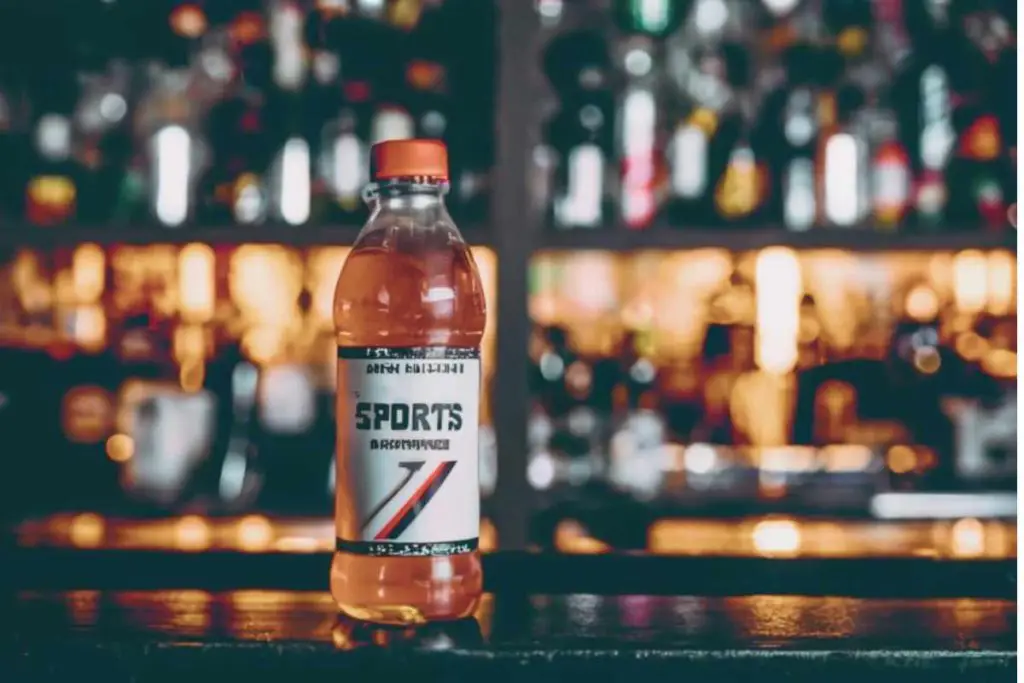
Frequently Asked Questions
In the bustling atmosphere of a bar, bartenders must remain well-hydrated, especially when alcohol is ever-present. This section answers common questions to help bartenders manage hydration efficiently.
How can bartenders effectively manage hydration while frequently exposed to alcohol?
Bartenders should prioritize regular water breaks, aiming for a glass between alcoholic drinks to maintain hydration levels. It’s also helpful for them to have a bottle of water easily accessible throughout their shift.
What ratio of water to alcohol consumption is recommended to prevent dehydration?
A commonly recommended guideline is to consume one glass of water for every alcoholic beverage served or consumed. This helps to counteract the dehydrating effects of alcohol.
Which beverages provide the fastest hydration recovery for individuals consuming alcohol?
Water is the most effective for quick hydration recovery. However, electrolyte-rich beverages like sports drinks can also be beneficial after consuming alcohol to replenish lost minerals.
What are the best practices for staying hydrated during a shift involving alcohol service?
Bartenders should drink water consistently throughout their shift, incorporate hydrating snacks like fruits and vegetables, and take short breaks to rehydrate if they’re feeling the effects of dehydration.
Can consuming water alongside alcoholic beverages help prevent the negative effects of dehydration?
Yes, alternating between water and alcoholic beverages can help reduce dehydration risks and may also curb the consumption of alcohol.
What signs of dehydration should bartenders be aware of when serving alcohol?
Bartenders should watch for signs like excessive thirst, dark-coloured urine, dizziness, and fatigue in themselves and their patrons, as these can indicate dehydration.

